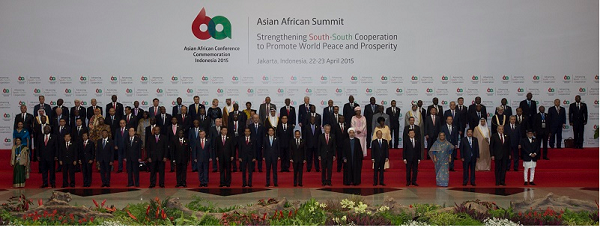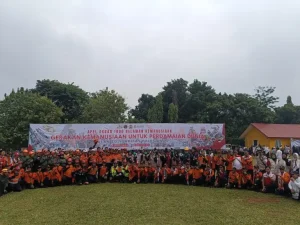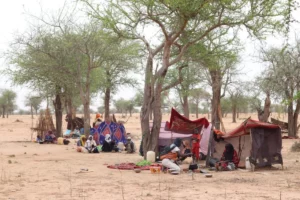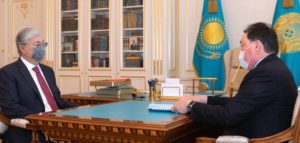 Here is the result of declaration on reinvigorating the new Asian-African strategic partnership in the 60 th Asia-Africa Conference Commemoration, Jakarta-Bandung, April 19-24, 2015.
Here is the result of declaration on reinvigorating the new Asian-African strategic partnership in the 60 th Asia-Africa Conference Commemoration, Jakarta-Bandung, April 19-24, 2015.
- 1. We, the Leaders of Asian-African countries, assembled in Jakarta and Bandung, Indonesia on 22-24 April 2015 to commemorate the 60th Anniversary of the Asian-African Conference and the 10th Anniversary of the New Asian-African Strategic Partnership, under the theme of “Strengthening South-South Cooperation to Promote World Peace and Prosperity’’ reaffirm our commitment to expand, deepen and solidify the longstanding cooperation between Asia and Africa.
- We continue to uphold the Spirit of Bandung, enshrined in the Asian-African Conference in 1955, as a beacon in guiding the future of Asian-African cooperation, while adhering to the core principles of solidarity, friendship and cooperation.
- We pledge to strengthen our cooperation within the framework of the New Asian-African Strategic Partnership (NAASP) as a platform, serving as the bridge that links Asian- African countries. We, therefore, underline the importance of practical and sustainable cooperation based on comparative advantage, equality of partnership, common ownership and vision, as well as a firm and shared, conviction to address common challenges.
- Reiterating the principle and benefits of multilateralism, we resolve to further strengthen and support the United Nations and other multilateral and regional forums so they work more effectively towards strengthening peace and prosperity in Asia and Africa as well as other regions. We call for continued efforts to reform the United Nations, including the revitalization of the General Assembly and a comprehensive reform of the Security Council, which corresponds to the collective interests of developing countries. A reformed Security Council will significantly increase representation of Asia and Africa.
- We are committed to redouble and launch multiple efforts that promote trade and investment growth, including through inter-regional and local cooperation, improving intra and extra-regional connectivity, creating conducive investment and business climate, building regional infrastructure and revitalizing sectors that concern present and future generations, including agriculture, food and water security as well as infrastructure cooperation and energy security. We commend the supportive role of the Asian-African Business Summit (AABS) in fostering private sector partnership and advancing Asian- African cooperation in various fields.
- We continue to encourage closer people-to-people connectivity by strengthening contacts and networks among businesses, academics, and in particular women and youth, so as to bring about equitable prosperity, harmony and lasting peace among the Asian-African countries.
- We dedicate ourselves to accelerated, stable and sustained inclusive economic growth, which creates decent and productive employment that rapidly reduces inequality; nurtures sustainable social protection programs; improves industrial and manufacturing capacity; increases value addition and facilitates economic diversification; strengthens resilience to external shocks; and-fosters rapid inclusive, resilient and sustainable socioeconomic development leading to eradication of poverty.
- We reaffirm the need to further empower our two regions in the production supply chain by further promoting cooperation for the purpose of increasing production, productivity and value addition in the agricultural sector in the context of sustainable development.
Progressing our Partnership
- We are encouraged by the rapid and robust development as well as dynamic transformation in political, economic, and socio-cultural sectors of Asia-Africa. We recognize that common challenges could be overcome by closer South-South cooperation and triangular cooperation. Therefore, at this historic juncture, we reinvigorate our commitment to a stronger, more inclusive, and sustainable New Asian- African Strategic Partnership.
- While reaffirming that South-South Cooperation and its agenda have to be set by countries of the South, we call for the active involvement of development partners and other related stakeholders in various mechanisms within South-South Cooperation, and triangular cooperation to inter alia, mobilize their support, share and exchange best
practices, as well as promote transfer and development of technology, to further enhance South-South cooperation initiatives based on the principles of mutual benefit, non-conditionality, equality, national ownership, respect for national sovereignty, as well as non-interference in domestic affairs. We also recognize that South-South Cooperation continues to serve as a complement to, and not a substitute for, North-South development cooperation.
Also Read: Rally of 1,000 Indonesian Volunteers Held to Support Gaza Reconstruction
- We are commited to carrying forward the NAASP by implementing ambitious goals and practical initiatives, with the aim at enabling Asia and Africa to play a more active, coordinated and leading role on various issues of common concern. We, therefore, call on our Ministers and officials to galvanize necessary actions to arrive at a successful conclusion on the 8 Focus Areas of Cooperation as recommended by the NAASP Senior Officials Meeting in Jakarta, October 2009, namely Counter Terrorism; Combating Transnational Organized Crimes; Food Security; Energy Security; Small and Medium Enterprises; Tourism; Asian-African Development University Network; Gender Equality and Women Empowerment. We instruct our officials to conduct future review and evaluation of the NAASP’s activities periodically
- We commend countries in Asia and Africa for their valuable contribution to the realization of the New Asian-African Strategic Partnership Capacity Building for Palestine, during the period of 2008-2013, including the capacity building assistance that supported 10,000 Palestinians, and we are committed to maintain contributions, through the extension of the Strategic Partnership for the period of 2014-2019.
A Strategic Partnership of the Future
- We commend the significant and major contributions by Asian-African countries to the maintenance of international peace and security under the auspices of the United Nations, particularly through the UN Peacekeeping Operations, where more than 87% of peacekeeping personnel in the field come from Asian-African countries. Recalling the principles enshrined in the Final Communiqué of the 1955 Bandung Conference, we reaffirm our commitment to uphold the agreed principles of the UN peacekeeping. We resolve to strengthen cooperation among peacekeeping centers in the two regions to facilitate capacity building cooperation through sharing of experiences, lessons learned, best practices and training programs.
- While we recognize the challenges posed by transnational organized crimes, we underscore the importance of Asian-African cooperation to combat such crimes, among others through exchange of information, training, mutual legal assistance, or extradition in line with domestic law and relevant international instruments.
- We underscore the importance to strengthen cooperation to prevent and combat terrorism in all its forms and manifestations, address the conditions conducive to the spread of terrorism and commit to develop concrete forms of cooperation, including in countering the appeal of terrorism, countering violent extremism, the financing of terrorism including payment of ransom, countering the use of internet for terrorist purpose, as well as promoting and protecting human rights while countering terrorism.
- We reiterate the need to enhance interregional cooperation and coordination in order to develop inclusive and effective strategies to combat terrorism in a comprehensive and integrated manner.
- We recognize the importance of protection of genetic resources, traditional knowledge and folklore. Therefore, we support the current process under Intergovernmental Committee on intellectual Property, Genetic Resources, Traditional Knowledge and Folklore of World Intellectual Property Organization toward the objective of reaching agreement to ensure the appropriate protection of Traditional Knowledge, Traditional Cultural Expressions and Genetic Resources.
- We emphasize the need to strengthen cooperation in the agricultural sector as part of our future agenda to improve food security, whiie stressing the importance of sharing knowledge, practices and technologies through collaborative research and development projects, to better the livelihoods of rural communities and small and medium-scale farmers of Asia and Africa.
- We reiterate the importance of “Quality Growth” which values inclusiveness, sustainability, and resilience for poverty reduction. In order to realize “Quality Growth” in all Asian-African countries, we share the intention to promote public-private partnership, especially for quality infrastructure development, advance capacity-building among local people and share our knowledge and experiences for enhancing resilience to climate change, natural disaster and for the attainment of both the Millennium and Sustainable Development Goals.
- We underline the importance of cooperation in advancing the blue economy and maritime-based economy, strengthening public-private partnership (PPP) to develop maritime infrastructure, enhancing collaboration among the PPP centers in Asia-Africa, exchanging experiences in establishing nautical highways (sea-tolls), ensuring freedom of navigation, maritime safety and security, navigational safety in the sea lines of communication, and ensuring the inclusion of small-scale fisheries sector in the global value chain.
- We recognize the importance of pursuing more conducive and enhanced trade and investment policies that would push forward better flow of goods and services. We underscore the importance of promoting inter-regional economic cooperation in the two continents, inter alia through the promotion and facilitation of direct trade and investment and in this regard, we applaud the WTO’s decision to hold its Ministerial Conference in Nairobi, Kenya in December 2015, for the first time in Africa.
- We commit to further strengthen the collaboration among countries of the two regions in the development of reliable and affordable infrastructure in order to increase regional connectivity and to boost trade, investment, bankable projects and assistance, industrial development, maritime cooperation, specifically to initiate a forum for SME to bridge the gap, energy security, knowledge and technology transfer in Asian-African countries through science, technology and innovation, including cooperation on maritime air transport, roads, energy and telecommunications and easing of travel visa restriction. In this regard, we, support the ongoing efforts to substantiate the establishment a forum for small and medium-scaled industries between Asian and African countries and invite ail other countries to join this forum.
- We underline the importance of the cooperation between the two regions by utilizing all existing partnership initiatives through other existing initiatives, inter alia the Tokyo International Conference on African Development (TICAD), Forum on China-Africa Cooperation (FOCAC), India-Africa Cooperation, Indonesia-Brunei Darussalam sponsored Non-Alignment Movement Centre for South-South Technical Cooperation, NAM Institute for the Empowerment of Women (NIEW), Iran-Africa Forum, Arab-Africa
Forum, South African Development Partnership Agency, Malaysia Technica! Cooperation Program, Vietnam-Africa Forum, Africa-Turkey Partnership, Korea-Africa Forum, Pakistan’s Special Technical Assistance Programme (STAP), Egyptian Agency of Partnership for Development, D-8 Organization for Economic Cooperation, the Smart Partnership Initiative, the Langkawi International Dialogue, Economic Cooperation Organization, the Group of 15 and the Thai-Africa Initiative (TAI), Non-Aligned Movement (NAM) Center for Human Rights and Cultural Diversity, and the Economic Cooperation Organization (ECO).
- We welcome China’s initiatives to provide 100,000 training quotas to Asian-African developing countries for 5 years; to hold get-together events in China annually for youth from Asia and Africa; to establish an Asian-African cooperation center in China; to launch a programme on exchange and study of international law between Asian-African legal consultative organization and China, and to hold an international symposium on the theme of carrying forward the spirit of Bandung this year. We also welcome Japan’s announcement on human resource development in Asia and Africa, totaling 350,000 persons over the next 5 years. We further welcome India’s continued engagement with Africa and Asia towards their economic development, infrastructure up-gradation, capacity building and maritime security. Every year around 15,000 training programmes for Africa and Asia; annual grant in aid-funded projects for the Pacific Island states; and cooperative projects for ASEAN countries are implemented. The Pan-Africa e-network is providing tele-education and tele-medicine services to 48 African countries and will expand to include Pacific Island states.
- We reiterate that fulfilling the ultimate objective of the United Nations Framework Convention on Climate Change will require strengthening the multilateral, rules-based regime under the Convention. We, therefore, further reaffirm our resolve to continue the negotiations on climate change under the Convention and to adopt, at COP-21/CMP-11 UNFCCC, in Paris, in 2015, a protocol, another legal instrument or an agreed outcome with legal force under the Convention applicable to all Parties, and adhering to the principles set out in the Convention, on the basis of equity and common but differentiated responsibilities and respective capabilities in light of different national circumstances.
- We welcome Indonesia’s chairmanship of the Indian Ocean Rim Association (IORA) from 2015 to 2017. We support Indonesia in promoting concrete cooperation in the lORA’s six priority areas namely maritime safety and security; trade and investment facilitation; fisheries management; disaster risk reduction; academic and science and technology cooperation as well as tourism and cultural exchanges inter alia under the themes of the Blue Economy and the Green Economy.
- We recognize the need to continuously strive in strengthening democratic institutions, good governance and the rule of law, transparency and accountability, human rights, and fight against corruption. We, therefore, commit to enhancing capacity building, technical cooperation and sharing of best practices in these areas.
- We commit to strengthening solidarity and cooperation among Asian-African countries to combat epidemics, communicable and infectious diseases, in particular the current Ebola outbreak. We underline the importance of proper early warning, preparedness, resilient public health systems, well-trained and appropriately equipped health workers, cross- sectoral action and greater national, regional and international collaboration, and enhancing the coordinated responses to the epidemics.
- We will revitalize the New Asian-African Strategic Partnership by improving its operational framework, by:
- Organizing a Commemorative Asian-African Summit every ten years;
- Consolidating the institutionalized process of the NAASP by rotating the cochairmanship of NAASP every four years as stipulated in the NAASP Declaration 2005;
- Organizing biennial ministerial consultations at the sidelines of the UN General Assembly in New York to provide strategic direction for Asian-African partnership;
- Organizing annual meetings between Co-chairs;
- Strengthening people-to-people interactions, particularly in business, academia, media, youth and sports as well as civil society. In this regard, we encourage interregional University to University (U to U) cooperation, including the establishment of an Asian-African Academic Forum to strengthen closer collaboration among higher education institutions and academicians in the two regions. We also see the benefits of establishing a network of Asian-African think-tanks to enhance research and assist policy development.
- We welcome the offer of Indonesia to host Asian-African 10 Kilometer Run in 2016 to foster friendship and solidarity among youth from both regions.
- We are committed to working together to shape the future of the Asian-African countries, so as to harness the energy of our respective economies and to make contribution to the long-term development and common prosperity of the two regions.
- We will review the progress of implementation of this Declaration in the next Summit of Asian-African countries.
(P008/R03)
Mi’raj Islamic News Agency (MINA)
Also Read: Indonesia’s Rizky Ridho Surpasses Barcelona Star in FIFA Puskas Award Voting





































 Mina Indonesia
Mina Indonesia Mina Arabic
Mina Arabic